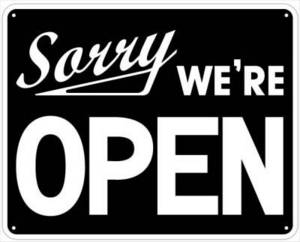I am at the Wharton School for a conference on emotions and retailing (see below).
I have written and spoken about the ways that humor is important. In short, humor enhances your well-being because it is pleasurable, smoothes social interactions, and enhances coping. This visit, however, got me thinking about ways that humor is important in retailing contexts.
Three reasons why humor is important to retail:
1. Customers want it: Humor helps create a more pleasing environment and helps create more enjoyable interactions with sales people and customer service agents.
2. Employees want it: People work for more than just money. Retail environments are workplaces. Employees want an enjoyable, fun place to work.
3. Brands (might) want it: Humor is a way to delight customers – a goal of any company that relies on word of mouth. Moreover, to the degree that brands position themselves as fun (which occurs pretty much any time that a brand advertises humorously), retail experiences should be consistent with that positioning.
I suspect that you are thinking about the risks of pursuing humor in retail environments. And you are right to. I have considered these risks and have a solution. But you will have to come back later to learn about those solutions.
———————————————————————–
Emotional Connections in Retailing: Designing Consumer and Employee Emotional Experiences
Conference Description:
Academic-industry conference for leading academics and retail executives featuring state-of-the-art research on emotion in marketing and management/organizational behavior as well as industry practice.Topic:
Retailers are increasingly interested in the experiences they deliver to their consumers, managing and integrating consumer touch points to deliver brand-consistent experiences throughout. Emotions are an integral part of all stages of the retailing experience. During their shopping experiences, consumers may experience a range of emotions—excitement, happiness, hope, love, sadness, fear, anxiety, anger, disgust, etc.—, each of which may uniquely impact consumer decision making, behavior, and interactions.Retailers are faced with the unique challenge of not only understanding and predicting the emotions consumers experience, but also with shaping retail environments and service encounters to cultivate desired emotions and eliminate undesired emotions. Retailers can do so externally, for example, strategically managing store design, product layout, etc. They can also do so internally, creating appropriate cultures, designing jobs, and managing employee performance in a way that recognizes the importance of employee emotions in their delivery of the customer shopping experience, as well as the importance of understanding the role of emotions in employee work performance overall and the success of the enterprise.
In this conference, we will explore some of the latest thinking on emotion in marketing and organizational behavior to better understood and optimize the retailing experience, connecting employee and consumer emotional experiences.
